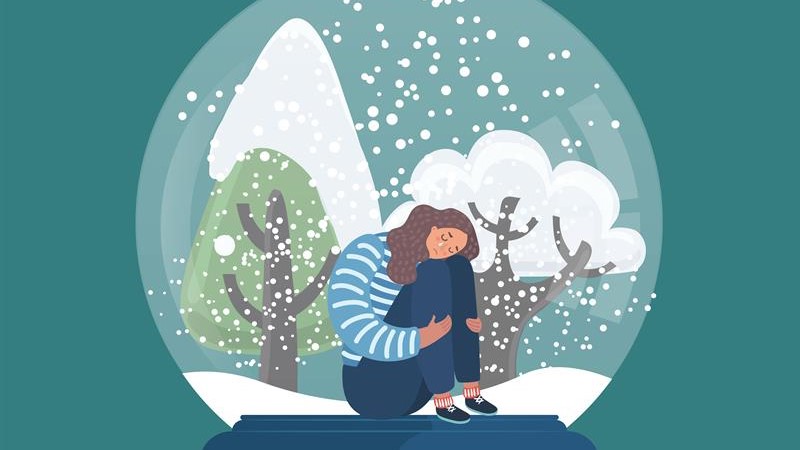For many people, depressive symptoms can begin to appear during the winter months. Graphic from HR Magazine.
AIDAN GREGG | OPINION COLUMNIST | agregg1@butler.edu
As the weather gets gloomier and the days get shorter in Indiana, our mood can begin to reflect the changes in the seasons.
Seasonal affective disorder, also known as seasonal depression, is a type of depression that tends to creep in during the winter months. People experiencing seasonal affective disorder may feel a decrease in energy, depressed mood, difficulty concentrating or changes in weight.
Tara Lineweaver, a professor of psychology at Butler, provides a scientific perspective on seasonal affective disorder.
“Seasonal affective disorder is kind of a subset of a major depressive disorder,” Lineweaver said. “In the winter months as the days get shorter, people are exposed to less sunlight and that can affect their circadian rhythms and then that can lead to depressive episodes occurring more frequently during dark months than during light months.”
Major depressive disorder can occur at any point during the year and is not necessarily tied to seasonal changes, whereas seasonal affective disorder is a type of major depression that is linked to seasonal changes.
Alex Poore, a first-year art and design and chemistry double major, has dealt with seasonal affective disorder and said that it drained her energy.
“[During] dark seasons, I was really struggling with my motivation,” Poore said. “I struggled to get out of bed. I couldn’t really do anything or have the energy for it or like if I did do something, I’d need a nap afterwards because it was so draining. I really kind of felt like I was in this inexplicable funk.”
When you don’t have the motivation to do the things you enjoy, it can be even harder to get out of a depressive episode.
Michael Lotz, a doctoral psychology intern with Butler’s Counseling and Consultation Services, said that seasonal affective disorder can be particularly difficult to deal with because it tends to snowball on itself.
“With less light, people start to feel more fatigued,” Lotz said. “The more fatigued we feel, the more we sleep. The more sleep we get, the more tired we feel, and when we feel more tired, we don’t want to engage in activities. We don’t want to socialize.”
Seasonal affective disorder affects millions of adults in the United States alone during the winter months. Because of this, it is especially important to reach out to your friends and family and check in on their mental health.
Deanna Lozyniak, a doctoral psychology intern with Butler’s Counseling and Consultation Services, said reaching out helps friends and family understand that you care about them.
“Just the sheer fact of reaching out and having that connection point, can kind of help to mitigate some of the [symptoms of depression] … like those natural feelings of isolation or that desire to kind of withdraw a little bit,” Lozyniak said. “It signifies like, ‘Hey, I care about you [and] I’m here for you.’ So that is a nice, foundational piece of [reaching out].”
Obviously reaching out is very important, but sometimes it can be difficult for people who haven’t dealt with depression to do so. Worrying about saying the right thing or overstepping boundaries can prevent people from checking in on their friends.
Poore provides some advice on what things are helpful to say when reaching out.
“[Reaching out] can really be as simple as like a phone call or a text message and just asking, like, genuinely asking, ‘How are you?’” Poore said. “I [also] really appreciate hearing like, ‘I completely understand where [you’re] coming from [and] your feelings are valid’ when it comes to this kind of thing because there are a lot of people who [will invalidate your feelings].”
Lineweaver agrees with Poore, but adds that people struggling with their mental health should seek professional help.
“Your job as a friend is to encourage them to get professional help to manage the depressive symptoms,” Lineweaver said. “That would be recommending going to the counseling center, or finding a psychologist or psychiatrist in the community that they could talk to. Someone who would be able to help them figure out if they meet the criteria for a diagnosis, and then help implement any treatment that might be appropriate to help them.”
If it seems like someone you care about might be struggling with their mental health, it is very important to check in with them. As someone who struggles with depression, I can’t emphasize enough how helpful it is to have friends reach out.
Healthline: Basic information about depressive symptoms, how to offer support to a loved one, and what to avoid.
VeryWell Mind: How to talk to friends about your depression.
Johns Hopkins Medicine: What to know about seasonal affective disorder.
U.S. Department of Health and Human Services: How to find mental health support.



